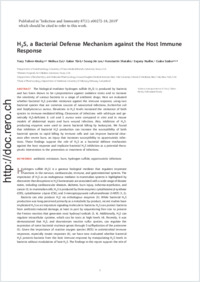H2S, a Bacterial Defense Mechanism against the Host Immune Response
- Toliver-Kinsky, Tracy Department of Anesthesiology, University of Texas Medical Branch, Galveston, Texas, USA - Shriners Hospitals for Children, Galveston, Texas, USA
- Cui, Weihua Department of Anesthesiology, University of Texas Medical Branch, Galveston, Texas, USA
- Törö, Gábor Department of Anesthesiology, University of Texas Medical Branch, Galveston, Texas, USA
- Lee, Seung-Jin Department of Anesthesiology, University of Texas Medical Branch, Galveston, Texas, USA
- Shatalin, Konstantin Department of Biochemistry and Molecular Pharmacology, Howard Hughes Medical Institute, New York University School of Medicine, USA
- Nudler, Evgeny Department of Biochemistry and Molecular Pharmacology, Howard Hughes Medical Institute, New York University School of Medicine, USA
- Szabo, Csaba Department of Anesthesiology, University of Texas Medical Branch, Galveston, Texas, USA - Shriners Hospitals for Children, Galveston, Texas, USA - Chair of Pharmacology, Department of Medicine, University of Fribourg, Switzerland
-
01.01.2019
Published in:
- Infection and Immunity. - 2019, vol. 87, no. 1, p. e00272-18
English
The biological mediator hydrogen sulfide (H2S) is produced by bacteria and has been shown to be cytoprotective against oxidative stress and to increase the sensitivity of various bacteria to a range of antibiotic drugs. Here we evaluated whether bacterial H2S provides resistance against the immune response, using two bacterial species that are common sources of nosocomial infections, Escherichia coli and Staphylococcus aureus. Elevations in H2S levels increased the resistance of both species to immune-mediated killing. Clearances of infections with wild-type and genetically H2S-deficient E. coli and S. aureus were compared in vitro and in mouse models of abdominal sepsis and burn wound infection. Also, inhibitors of H2S- producing enzymes were used to assess bacterial killing by leukocytes. We found that inhibition of bacterial H2S production can increase the susceptibility of both bacterial species to rapid killing by immune cells and can improve bacterial clearance after severe burn, an injury that increases susceptibility to opportunistic infections. These findings support the role of H2S as a bacterial defense mechanism against the host response and implicate bacterial H2S inhibition as a potential therapeutic intervention in the prevention or treatment of infections.
- Faculty
- Faculté des sciences et de médecine
- Department
- Médecine 3ème année
- Language
-
- English
- Classification
- Biological sciences
- License
-
License undefined
- Identifiers
-
- RERO DOC 324120
- DOI 10.1128/IAI.00272-18
- Persistent URL
- https://folia.unifr.ch/unifr/documents/307669
Statistics
Document views: 123
File downloads:
- pdf: 189
